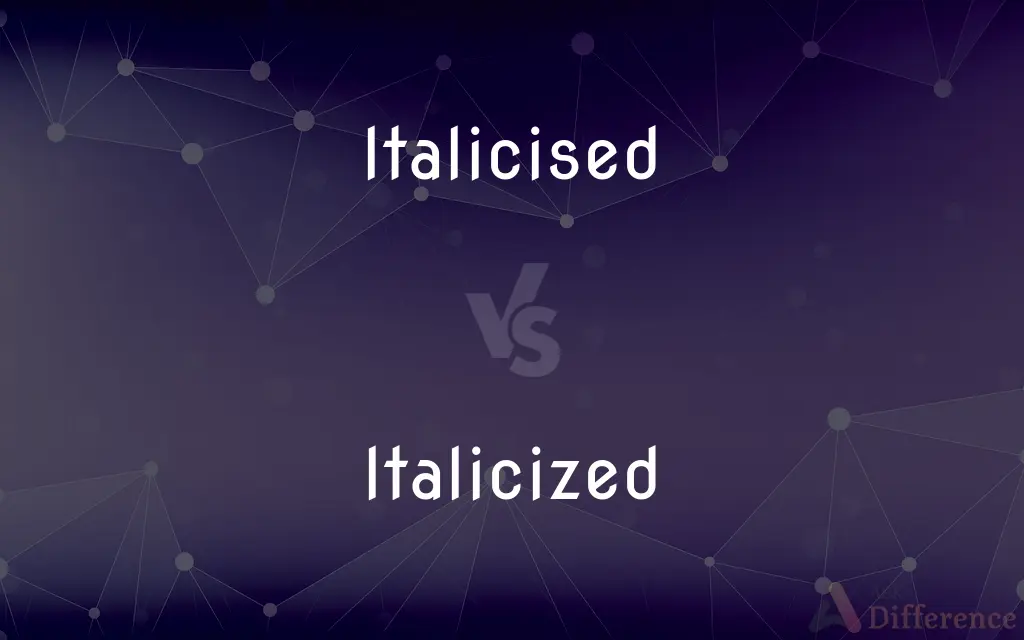Italicised vs. Italicized — What's the Difference?
By Fiza Rafique & Urooj Arif — Updated on April 17, 2024
Italicised and italicized represent the British and American spellings, respectively, of the past participle form of the verb "to italicize," used to describe text styled in slanted, cursive-like font.

Difference Between Italicised and Italicized
Table of Contents
ADVERTISEMENT
Key Differences
Italicised is the form commonly used in British English, emphasizing the variant spelling with an 's'. Whereas italicized is preferred in American English, reflecting the spelling convention with a 'z'.
In academic and professional writing, italicised is often seen in publications from the UK and other Commonwealth countries. On the other hand, italicized is predominantly used in the United States and in publications adhering to American English guidelines.
When considering digital content, websites or publishers based in Britain may default to italicised in their articles and posts. Conversely, American digital platforms will generally use italicized.
In educational contexts, British schools teach the spelling italicised as part of their curriculum. Meanwhile, American schools focus on the spelling italicized.
Software and word processors often offer language options that include UK or US English, affecting spell-check results: italicised in the former, italicized in the latter.
ADVERTISEMENT
Comparison Chart
Preferred Geography
UK and Commonwealth countries
United States
Used in
British academic and professional writing
American academic and professional writing
Digital Usage
British websites and publishers
American digital platforms
Educational Focus
Taught in British schools
Taught in American schools
Spell-check Default
UK English settings in software
US English settings in software
Compare with Definitions
Italicised
Styled in a way that the text appears slanted to the right.
Chapter titles are usually italicised for emphasis.
Italicized
Employed in scripts to indicate emphasis in speech.
His speech was italicized to show stress.
Italicised
Employed in scripts to indicate emphasis in speech.
Directions in the script noted the dialogue was to be italicised.
Italicized
Styled in a way that the text appears slanted to the right.
The book title on the cover was italicized.
Italicised
Turned into italics to emphasize or distinguish text.
The word italicised is often italicised in definitions.
Italicized
Turned into italics to emphasize or distinguish text.
Important terms in the document were italicized.
Italicised
Used to highlight key terms or phrases in academic writing.
Key concepts in the thesis were italicised.
Italicized
Applied in design to create a distinct visual style.
The italicized text gave the webpage a modern look.
Italicised
Applied in design to create a distinct visual style.
The logo used an italicised font for flair.
Italicized
Used to highlight key terms or phrases in academic writing.
Throughout the article, several words were italicized.
Italicised
Simple past tense and past participle of italicise
Italicized
To print in italic type.
Italicized
To underscore (written matter) with a single line to indicate italics.
Italicized
To emphasize
"italicizing the upper extremity of the pitch spectrum with flute or piccolo" (Arthur Berger).
Italicized
Simple past tense and past participle of italicize
Common Curiosities
What is the main difference between italicised and italicized?
Italicised is the British English spelling, while italicized is the American English spelling.
Why do British and American English use different spellings for the same words?
The variations often arise from historical spelling conventions and preferences that have evolved differently in the two regions.
Are there other examples of British and American English spelling differences?
Yes, other examples include colour/color, flavour/flavor, and organise/organize.
What should I consider when choosing between italicised and italicized?
Consider your audience and the standard language used in your geographic or professional context.
Will using the wrong variation affect my SEO?
Using the appropriate variation for your audience's language setting can slightly impact SEO, as search engines may prioritize local usage.
Is one spelling more correct than the other?
Neither spelling is more correct; the appropriateness depends on the linguistic context.
Do grammar checkers adapt to these spelling differences?
Yes, most grammar checkers can adapt to either British or American English settings.
Is there a difference in pronunciation between italicised and italicized?
No, both words are pronounced the same way.
Are there rules on when to italicise/italicize words in writing?
Common reasons to italicise/italicize include emphasizing words, denoting titles, or highlighting foreign terms.
Can I use italicised in American English documents?
It is recommended to use italicized in American English documents to adhere to standard spelling conventions.
How does the spelling affect text formatting?
The spelling does not affect how text is formatted; it only changes the presentation of the word itself.
How can I remember which spelling to use?
Remembering the geographic connection can help: "s" for UK, "z" for US.
Does the use of italicised vs. italicized change in digital versus print media?
The choice of spelling should remain consistent with the chosen language variety, regardless of the medium.
Can switching between British and American spellings create confusion?
Consistently using one spelling style helps maintain clarity and stylistic coherence.
What resources can help with understanding differences in British and American English?
Language guides, online dictionaries, and educational websites often discuss these differences.
Share Your Discovery

Previous Comparison
Lasso vs. Lariat
Next Comparison
Afore vs. BeforeAuthor Spotlight
Written by
Fiza RafiqueFiza Rafique is a skilled content writer at AskDifference.com, where she meticulously refines and enhances written pieces. Drawing from her vast editorial expertise, Fiza ensures clarity, accuracy, and precision in every article. Passionate about language, she continually seeks to elevate the quality of content for readers worldwide.
Co-written by
Urooj ArifUrooj is a skilled content writer at Ask Difference, known for her exceptional ability to simplify complex topics into engaging and informative content. With a passion for research and a flair for clear, concise writing, she consistently delivers articles that resonate with our diverse audience.














































